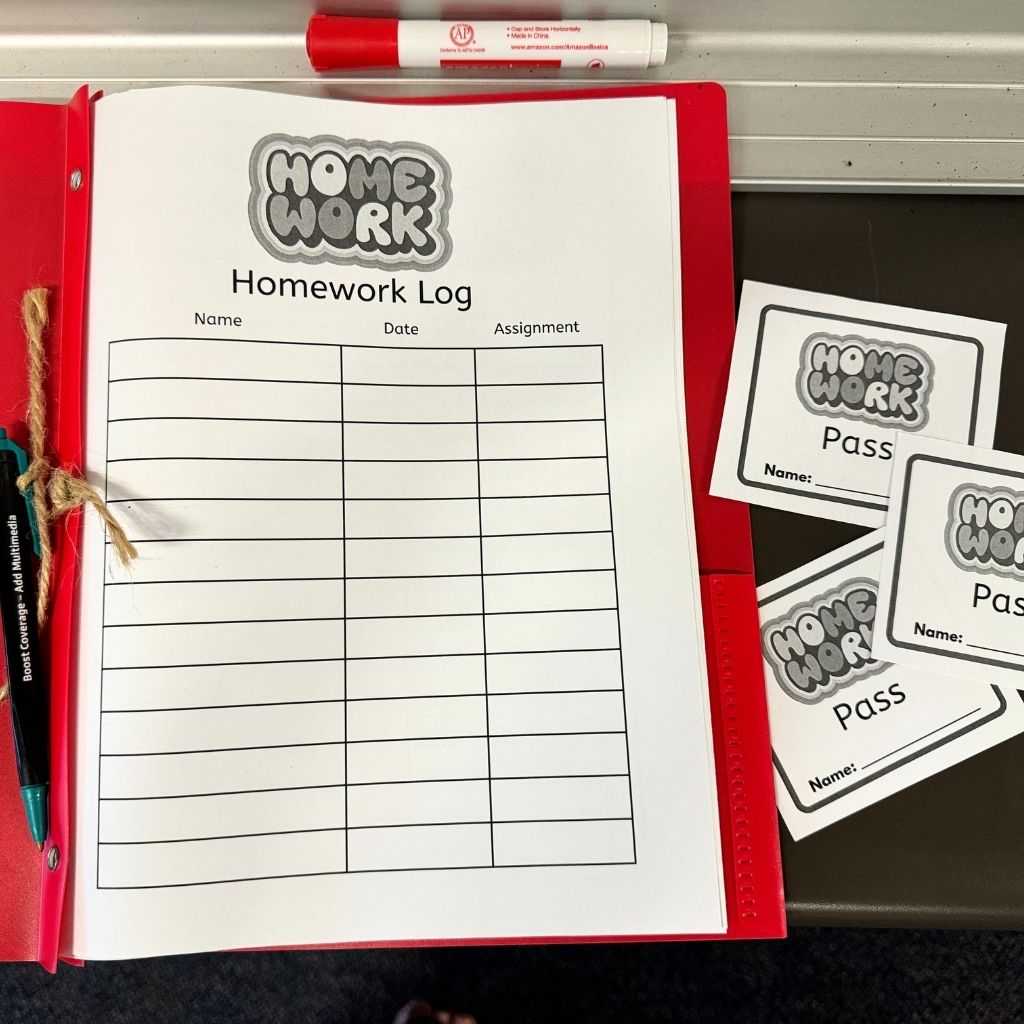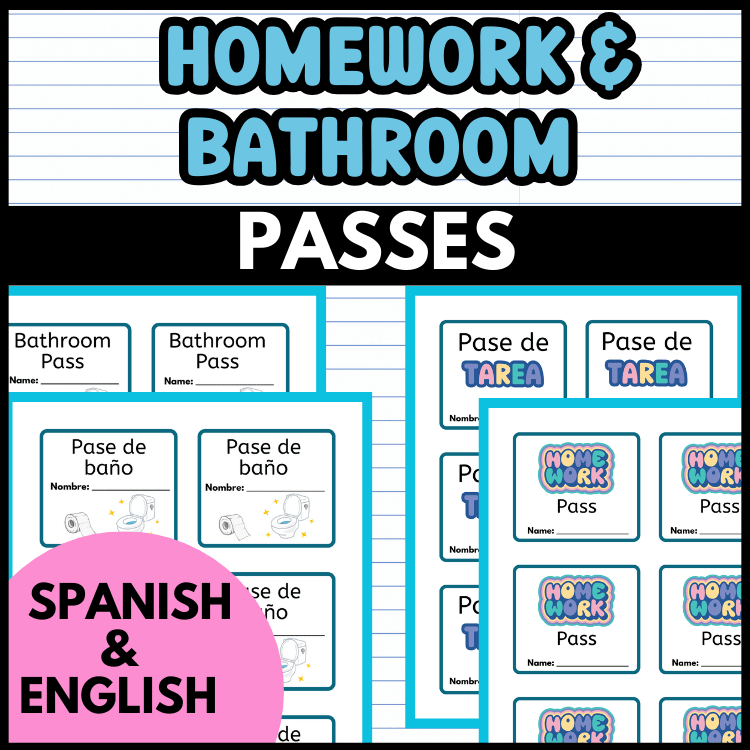The homework debate about whether students should be assigned homework or not is a hot topic. Depending on your school, you may or may not assign it.
Some schools have a strict policy that homework should not be assigned, while others don’t. There has been a huge movement toward not assigning homework but as a parent of a 4th grader and a teacher of 5th, I think there is a happy medium between no homework and daily homework.
Reasons Why 5th Graders Should Get Homework
Homework should not be all or nothing. I’m a proponent of assigning it in upper elementary (4th-6th) so that students can practice the skills they are learning. A balanced approach is achievable for the following reasons:
Reinforcement of Classroom Learning
Homework allows students to practice and reinforce what they have learned in class, helping to retain the skills they are learning. This is especially important in math since so much needs to be mastered before moving on to more difficult concepts.
Development of Study Habits
Assigning homework helps students develop good study habits and self-discipline, which are essential skills for academic success.
Time Management Skills
Homework teaches students how to manage their time effectively, balancing schoolwork with other activities.

Responsibility and Accountability
Completing homework assignments fosters a sense of responsibility and accountability in students, as they learn to take ownership of their work.
Parental Involvement
Homework provides an opportunity for parents to become involved in their child’s education, helping to support and reinforce learning at home.
Preparation for Future Academic Demands
Regular homework assignments prepare students for the increased workload and expectations they will encounter in middle school
Feedback for Teachers
Homework assignments provide teachers with valuable feedback on how well students understand the material, allowing them to identify areas where additional instruction may be needed.
Preparation for Tests and Assessments
Homework provides ongoing review and practice that can help students prepare for upcoming tests and assessments. Before state testing, we revisit skills taught at the beginning of the year and homework allows students to review these skills.
Building a Work Ethic
Completing homework regularly instills a strong work ethic, emphasizing the importance of diligence and perseverance in achieving academic goals.
What Type of Homework Should 5th Graders Be Assigned?
The best homework assignment should:
- Allow students to practice what they have learned
- Be something students can do on their own

Math Homework
Math assignments should be based on what you have taught.
Make your homework assignments meaningful and hold your students accountable by (quickly) checking them (more on that later).
The worst is when parents tell you that their child is frustrated and in tears while completing homework. Make sure to make assignments easy enough so that students can complete them on their own, and if they still can’t, modify the homework.
Always do the first few problems together
I have found that this helps students see exactly what it is that they need to do so there is no confusion or stress; it just helps them to get started.
When you do the first few problems together, this allows you to look over the problems and to make sure there isn’t anything that is too hard or something that hasn’t been covered. If there is, have students cross out those problems.
Fluency Homework
Assign homework that builds reading comprehension and vocabulary skills.
My students really enjoy doing historical Readers Theater so I include homework that connects with the script they have read in class.

I especially love when I can incorporate Social Studies standards during my ELA block. I wrote a blog post about how I incorporate Reader’s Theater when I teach my students about the Early Colonial Settlements. Above are some of the Reader Theaters plays that I have in my store. After my students read and perform a skit, I like to choose some of the following assignments for them to complete at home:
- Close reading questions
- True and False Comprehension Questions
- Vocabulary Matching and Graphic Organizer
- Comprehension Quiz
- Write a Summary page
- Write Your Own Skit Page
They can also take home the skit and practice their lines before their performance. It’s fluency reading with a purpose.
How to Grade Homework
Choose 5 problems randomly to grade.
No rule says that every problem has to be checked. This gives me an idea quickly of who is struggling and needs help on their assignments.
While my students are doing quiet morning work, I walk around their desks and collect their homework. Usually right then and there, I check the 5 problems so students get instant feedback, and it’s off my to-do list.
Use homework to assess who needs help.
If I see a student get most of them wrong, I will help them with that problem individually. If I’m in a rush, I just collect their papers all at once, and at my desk, I will check the 5 problems. Then I will pull a small group of students who need help during math or in the morning if time permits.
Assign Even or Odd Problems
Sometimes worksheets go too in-depth with too many problems. Depending on your grade, you don’t want students spending too much time on homework, so if the worksheet has too many problems, assign even or odd numbers.
How to Differentiate and Modify Homework
Some of your struggling students may not be able to complete the math homework that you assign, so it’s important to differentiate your assignments.
Cross out problems
For example, after I assign homework at the end of the day, I will ask students who need differentiation for their papers. I look over it and cross out math problems I know will be difficult for them or I change the problems.
Have students come to see you
I also tell these students that it is their responsibility to come up to me to ask me if their assignment needs to be modified. During the hustle and bustle of packing up and getting ready to go home, I sometimes forget to modify the assignments of these students, so I have them help me out by reminding me to do so.

How Often Should You Assign Homework?
Homework can be assigned daily, every Monday and Wednesday, or on Monday with a packet returned on Friday.
Daily
Homework can be assigned daily Monday- Friday but I don’t recommend that. As a teacher, this will be a lot of work to plan. You will either have to run copies daily or be super organized and do it the week before. What if your students are struggling with a math lesson that you need to reteach but you already ran homework copies for that lesson?
Assigning homework daily also doesn’t give parents the flexibility to have the assignment completed. Many students have commitments outside of the classroom and there can be a lot of pressure to get assignments done if they are due the very next day.
Weekly Packet
Some teachers assign a weekly packet that they give to students on Monday and it is due Friday. I know some parents who really like this because there is flexibility on when they can get the packet completed.
If you go this route, prepare to be doing a lot of correcting over the weekend. Not fun!
Mon, Wed
This is my favorite way of assigning homework. I assign my students homework twice a week on Monday and Wednesday. So they essentially have two days to complete it. Absent students have an opportunity to still complete the homework and turn it in when everyone else does. Also, if there is something that a student doesn’t understand, they have the next day to ask me. Students also have some flexibility on when they complete their assignments.
The best part about assigning homework on Monday and Wednesday is that I save instructional time on the days that I don’t have to pass out homework assignments and have students write their assignments in their agenda.
Homework Club
If students have turned in their homework for the whole month, they are part of the Homework Club. It’s not really a club, I just like to call it that to make it sound more official. I take a picture of them and post it on our parent messaging system congratulating them.

These students get a homework pass that they can use the following month. They can choose any homework assignment to not complete, no questions asked! You can find the homework passes I use HERE.
If students have not done their homework, they write their name and the date in the “Missing Homework” folder. It provides a way for me to keep track of the students who are not completing their homework, which I look at when giving a homework grade.

Final Thoughts
In conclusion, the debate over homework assignments continues to spark discussion among educators and parents. While some schools or teachers have a no-homework policy, others (including myself) recognize its benefits for upper elementary students.
As both a parent and a teacher, I advocate for a balanced approach where homework reinforces classroom learning, develops essential study habits, and involves parents in their child’s education.
By assigning meaningful and manageable homework, teachers can support their students’ academic growth without overwhelming them.
Pin this post for later. Click on the image below to save it to your teacher’s Pinterest board. 📌📌📌





